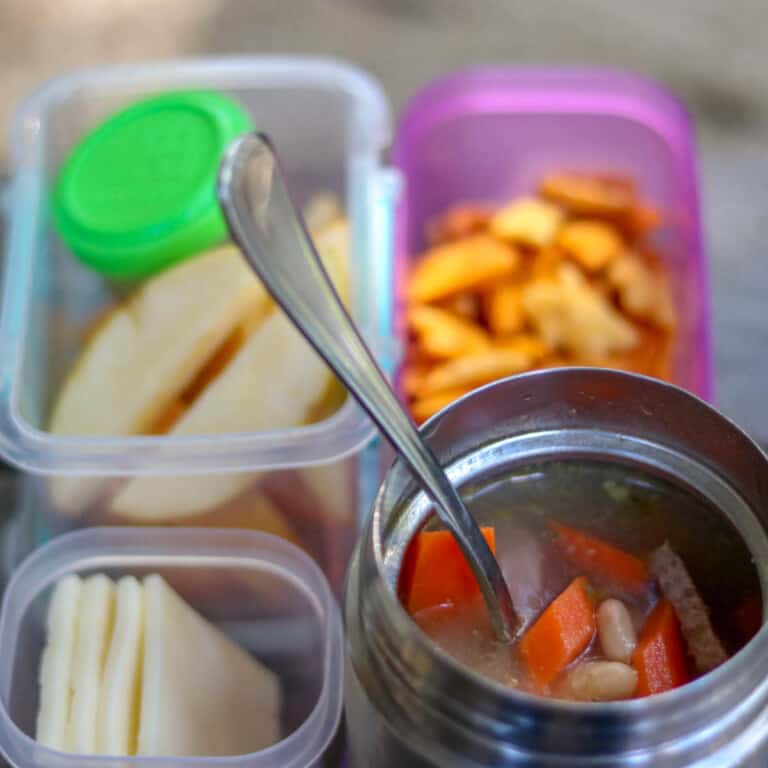The holiday season is certainly in full swing and a long break from school is fast approaching. Feeding children can take a lot of effort when things are in a “normal routine.” Traveling or having family visit can be an added challenge with feeding, especially with picky eaters.
Then, you add in irregular meal times, erratic sleep schedules, lots of exciting yummy foods, new challenging foods, and a man entering the house in the middle of the night and leaving presents! This can certainly be a recipe for lots of fun, but also lots of stress around kids’ eating.

The Scenario
I imagine you’ve been there or can relate: You’re at a holiday dinner. There are appetizers out and your child is hungry because she hasn’t eaten since lunchtime, because you’ve been at various holiday events. (Not to mention that she hasn’t napped in 4 days).
She fills up on pre-dinner snacks and then it’s time to sit down to dinner. Your extended family member tells your child she needs to eat or she won’t get cookies later. You cringe inside. (You’ve been reading Sunny Side Up Nutrition and haven’t been using food as rewards.)
The family member then looks at you and says they can make your child something different since she isn’t eating. You’re thinking, “She just ate pretzels, cheese and crackers and mixed nuts, she’s full.”

You want everyone to go back to eating and chatting and take the focus off of your child’s eating. That pressure can feel overwhelming and sometimes feel like a judgment of your parenting, even if that’s not the intention.
Some of this has gotten easier for me over the years as, I think, I have gotten more confident in my parenting. But I’ll admit this was hard for me at times, even though I am a dietitian!
However, I know when I am clear about what I am doing and have some action steps, feeding can feel a little easier. So, here are a few tips for feeding kids around the holidays that I hope will make the holidays just a little bit easier.
Tips for Feeding Children Around the Holidays from a Registered Dietitian:
1. Attempt to offer regular meals and snacks
Meal and snack times may not be the same as when school is in session. However, kids greatly benefit from regular sit down meals and snacks. Kids may eat less when foods are new or different.
By keeping to somewhat of a schedule, they will have several opportunities to meet their needs. When my family travels long distances by car, we will have a specific “snack time” and offer snacks such as: homemade trail mix (cereal, sunflower seeds, dried fruit, chocolate chips), cheese, fruit and/or crackers, SunButter sandwiches on bread or graham crackers or fruit and a drinkable yogurt.

2. Let Your Child Still Decide How Much
I’ve written a lot about Satter’s Division of Responsibility in Feeding – parents decide when and what is served and kids decide if and how much. I think feeding kids can be hard when you add new people to the mix because everyone approaches food differently with their children.
When you add in extended family, it can be even harder as parents or in-laws may have even raised you or your spouse differently. I know I have felt pressure for my kids to “eat well” because I felt like people were watching.
That added pressure can be transferred to pressure on our children, even if we don’t want it to. And we know pressure doesn’t work. Allowing your child to decide how much he eats, even if it’s a little or a lot, helps him listen to his body and gain eating skills.
A good thing to remember is that we don’t really know what others are thinking, but if they say something you can set a boundary (See tip #5).
3. Don’t Restrict Sweets
In many families, there are more sweets around this time of year. Children are learning about the world around them and part of that is navigating holiday sweets.
We know if we restrict sweets, children are more likely to eat them and more of them when they are not hungry. During the holidays, they very well may have a lot of cookies at a snack time and not eat very much dinner, but that’s a learning experience and they will be okay.

Love this post and want to save it for later?
Just fill in your email address below, click “Save It” and get it delivered right to your inbox.
4 . Follow the House Rules
I talk to my kids about following the “House Rules” when it comes to food. This is part of learning manners and navigating food out in the world. For example, at home, we will often have a dessert with our dinner and there’s no talk about eating dinner first before you eat dessert.
However, when we go to someone else’s house, we talk about the fact that their rules may be different. They may offer dessert after dinner. As guests in their home, we will follow their rules.
Where I don’t expect them to follow the rules is if it involves someone else deciding how much they will eat. A gentle conversation about what may happen with food at the event (there may be appetizers, a buffet, or certain foods), may be reassuring to your your child.
You can explain that you will follow the host/hostess’s rules with food and they may be different than at home, but also assure him that he doesn’t have to eat anything he doesn’t want to.

5. Hold a Boundary
People may make comments about your child’s eating. “You need to finish your plate.” “You’re so picky.” “Whoa, you eat as much as an adult.”
If you think this may be the case with the people you will be with, it may be helpful to think about where you will hold a boundary. If someone is telling my child what or how much to eat, I will gently say, “She can decide what she eats.” or “Please do not comment on her eating. She has that covered.”
I also hold a boundary if weight loss or diet talk is the topic of conversation in front of my child. I may say, “Let’s talk about something else.” or “I don’t believe there are bad foods.” Mostly, I say these things for the benefit of my children hearing me say them and learning my food values.
I hope all of our readers have a happy holiday season! Please know, when it comes to eating and feeding, we’ve got your back and would love to know your challenges and successes! Let us know how it goes!

We’re Elizabeth & Anna!
It’s great to have you here. We’re registered dietitians and we share tips to support you in raising kids with a healthy relationship with food.





